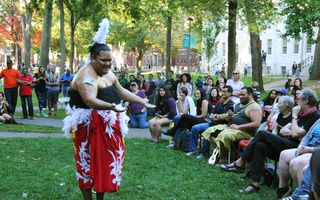At some point during your childhood, you were taught this rhyme. Almost every American knows the story of Christopher Columbus, the man who (sort of) discovered America. It is a fun story to teach children: A dashing Italian explorer wanted to prove that the world was round and bumped into the West Indies when he was looking for a route to India. More than 500 years later, his journey still graces our everyday lives with the annual Columbus Day holiday that is observed at Harvard.
But there is a lot more to the Christopher Columbus story than the PG version that American children are routinely taught in school. Although a three day weekend at the beginning of October is a well-timed holiday for many students struggling to cope with work, Christopher Columbus has left a negative legacy for many Americans. If we are to have a holiday, it should not be set aside to “celebrate” the actions of Christopher Columbus. Harvard, along with other universities, should consider re-naming the holiday “Indigenous Peoples Day.”
Although Columbus can be credited for generating European interest in establishing settlements in the Americas, he committed multiple atrocities after landing in and taking up the governorship of Hispaniola, the island today made up by the Dominican Republic and Haiti. Columbus and his men used the indigenous Taino people as sex slaves, and Columbus commonly rewarded his men by giving them young local women to rape. Columbus also sold the Taino as slaves to other parts of the world, and the Spanish arrival on the island quickly was quickly followed by the decimation of the Taino population. Whether this was the result of imported disease, famine, or the direct consequences of Spanish oppression remains a matter of historical debate. Suffice it to say, many Americans feel aggrieved that a man who was responsible for beginning a process of tremendous suffering and death for an indigenous population of the Americas is still accorded the honor of a federal holiday.
Columbus Day, as has been pointed out in The Atlantic, began as an effort to emphasize the diversity of American society. In the late 19th century, when newly arrived Italian immigrants suffered from discrimination on account of their dark skin and Catholicism, Columbus—Cristoforo Colombo as he is known in his country of birth—came to be celebrated as a symbol for a blossoming Italian-American heritage. He quickly became pitted against Leif Erikson, the 11th century Viking explorer who landed in Newfoundland and favored choice of Gilded Age America’s WASP ruling class. Columbus Day hence became a tool for new European immigrants to the U.S. to demand acceptance and recognition. As we can observe today, Cristoforo beat Leif in claiming the prime spot in our national imagination.
In 2012, however, the original purpose of this holiday is clearly outdated. Continuing to honor Columbus seems something of an insult to the many atrocities committed against Native Americans across North America since 1498. What’s more, the holiday’s current name will always help to sustain the insidious suggestion that Europeans discovered America. Harvard should follow the footsteps of Berkeley, Calif., and re-name the holiday “Indigenous Peoples Day.” We applaud the vigil hosted by Native Americans at Harvard to commemorate indigenous cultures on this year’s Columbus Day, and encourage Harvard itself to begin hosting an annual campus-wide vigil in 2013. This would not just help raise awareness of the historical abuse of Native Americans and make clear that we do not consider Columbus to have discovered America. By showing appreciation for Harvard’s diverse student body, this rename would also better serve the original goals of Columbus Day itself.
Read more in Opinion
Debased DebateRecommended Articles
-
America Discovers ColumbusI asked my 10-year-old brother what he had learned in school about Columbus. “Well,” he said with confidence, “his ships
-
Students Host Cultural VigilNative Americans at Harvard College commemorated indigenous cultures that existed before the arrival of Christopher Columbus in the Americas with candles at their Candle Held Vigil on Monday.
-
 Students Celebrate Indigenous Peoples’ Day
Students Celebrate Indigenous Peoples’ Day -
City Council Tables Resolution to Rename Columbus DayThe Cambridge City Council tabled a resolution to rename Columbus Day as Indigenous Peoples’ Day for the third time this year in as many meetings, on Monday
-
Columbus Day No MoreChristopher Columbus has been glorified for too long with cute rhymes and parades that don’t account for the dark history that is inseparable from his name













